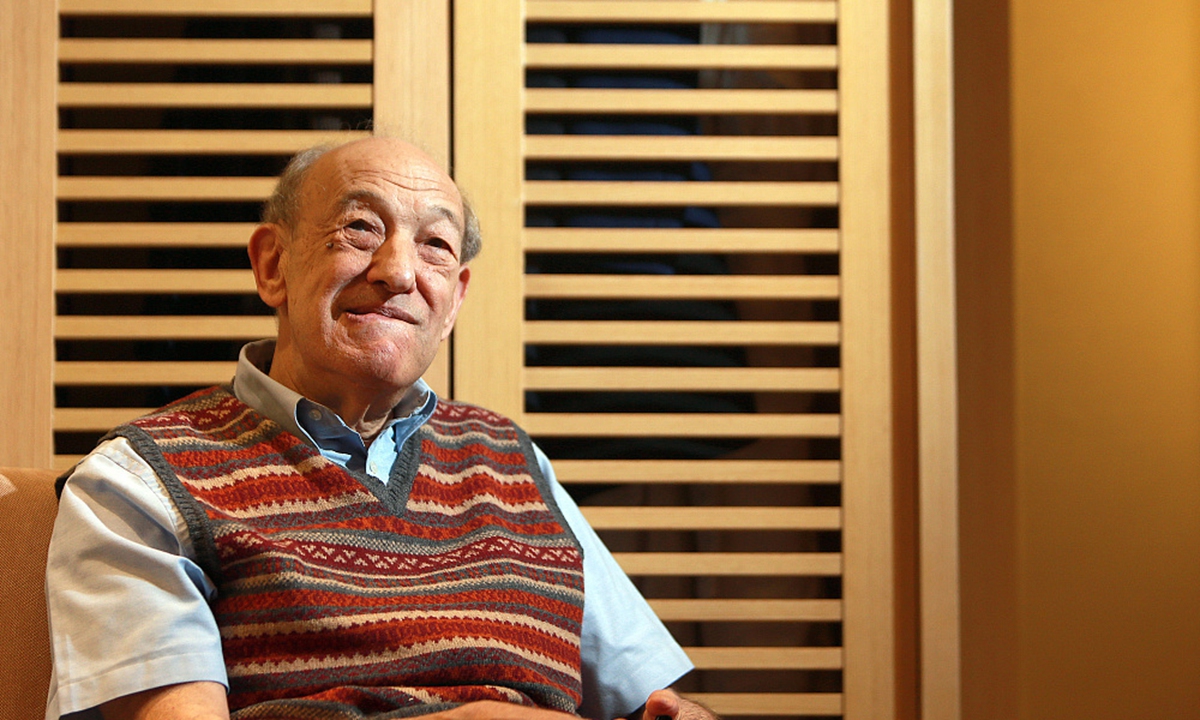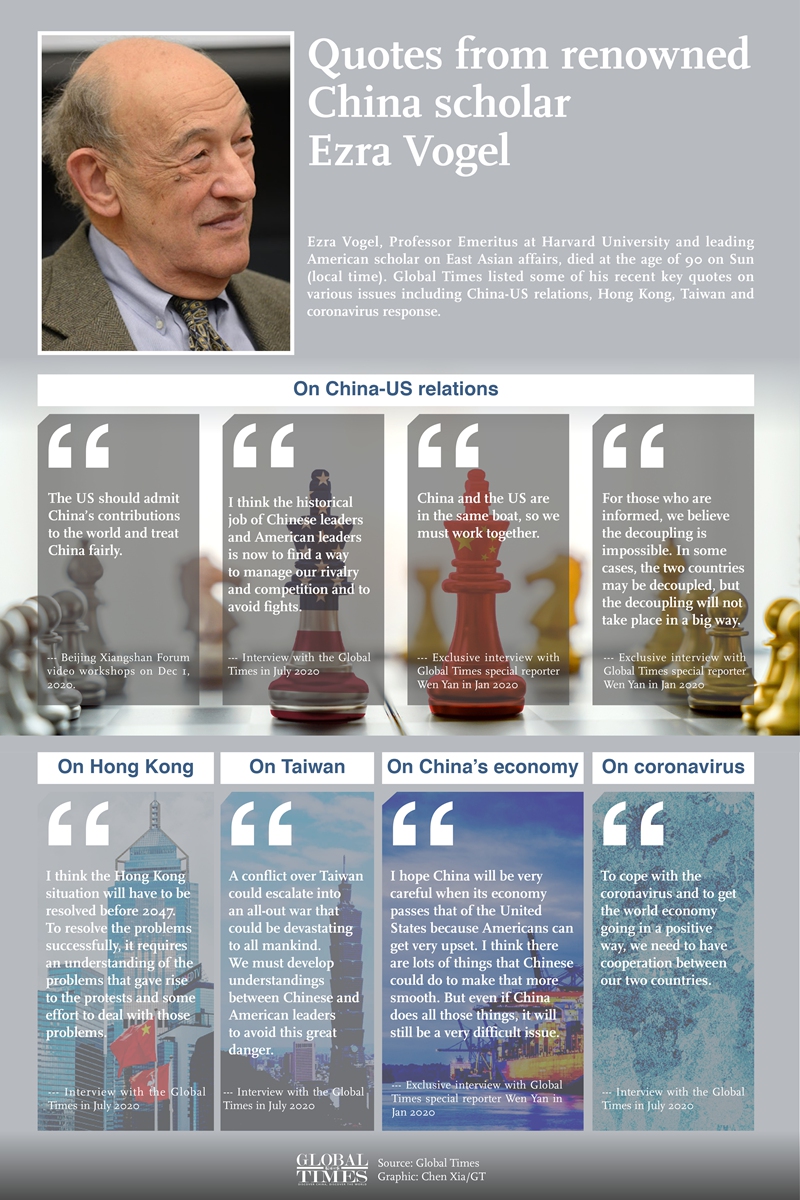Death of Ezra Vogel a ‘huge blow’ amid China-US tensions
By Yang Sheng, Xu Keyue and Wang Wenwen Source: Global Times Published: 2020/12/21 10:50:35
‘Huge loss’ to US, less ‘rational voices’ on China-US ties in Washington

Ezra Vogel, Professor Emeritus at Harvard University Photo: VCG
Ezra Vogel, professor emeritus at Harvard University and a leading American scholar on East Asian affairs, passed away at 90 on Sunday (local time), and the shocking news prompted a flood of tributes not only in the US but also many Asian countries, including China, Japan and Singapore, and the Chinese government, scholars and web users mourned the death of "an old friend of the Chinese people."
Vogel is a major supporter of the effort to inject sanity and balance into US thinking about China, and his death raised concerns that Americans who think clearly and rationally about China-US relations are getting fewer and are losing their voice, while "China hawks" - US politicians with hostile and biased views against China - are rising.
Wang Wenbin, spokesperson of the Chinese Foreign Ministry, at Monday's press conference expressed deep condolences on the passing of Vogel, calling him an "old friend of the Chinese people." Wang said China will remember his contributions to advancing China-US relations.
Vogel died at the age of 90 on Sunday (local time), according to the Fairbank Center for Chinese Studies at Harvard University. Vogel's interpreter also confirmed the news with the Global Times on Monday morning. Experts have called the sad news a "huge blow," especially in this "turbulent time" in China-US relations.
Vogel expressed his concern over the worsening China-US relationship in his last interview with the Global Times in July. He said China and the US are now facing a historic task to "find a way to manage our rivalry and competition and to avoid fights." He stressed, "We have to find ways of living together."
He said in the interview that "the mood in Washington is anti-Chinese... But I believe after the election, whoever is elected... there is arecognition that even while we promote our own national interests, we must find new ways to have better relations with China and work on our common issues. I think we can expect a change after the election."
Just weeks before his death, Vogel said on December 1 at the Beijing Xiangshan Forum video workshops that US president-elect Joe Biden has brought new opportunities for China-US relations, and the US should recognize China's contributions to the world and treat China fairly.
His opinion, knowledge and contributions to boosting rational communication between the two countries are widely respected and admired among Chinese diplomats and scholars who also support the peaceful co-existence, and oppose confrontation and even a new cold war.

Quotes from renowned China scholar Ezara Vogel. Graphic: Chen Xia/GT
Many Chinese scholars, journalists and officials on international relations, diplomacy and China-US ties shared their feelings and experiences related to Vogel on major Chinese social media networks like WeChat and Sina Weibo. As of press time, the hashtag "Ezra Vogel passed away" got more than 360 million views.
Zhang Weiwei, a professor and director of the China Institute of Fudan University in Shanghai, shared long transcripts about an academic event in 2013 when he invited Vogel to have exchanges at Fudan University with the Global Times.
During the event, Vogel said in Chinese that Deng Xiaoping, China's leader from the late 1970s to 1990s, as well as the chief architect of China's reform and opening-up, is the only one that has amazed him with the greatest influence.
"I also asked Lee Kuan Yew [founding father of Singapore]. He told me that among the people who he met, no one can have greater influence than Deng Xiaoping," Vogel said, according to the transcripts.
Zhang, who was also Deng's English interpreter, told the Global Times that "it [the exchange with Vogel] was an unforgettable dialogue and memory."
Most Chinese people are familiar with his work Deng Xiaoping and the Transformation of China, which is an influential, popular, and objective masterpiece that took him ten years to finish with a great amount of interviews and research in China, and it is also one of the bestselling books about the former leader in China.
The book covered a series of key historic events in China from the late 1970s to 1990s. Some Chinese web users said he is the earliest and most professional and objective foreign scholar on researching China's reform and opening-up.
Zhang said, unfortunately, the current US academic circle is too influenced by politics, so works about China written by a younger generation of US scholars are mostly affected by the "political correctness" of anti-China or anti-Communism. Most of them are unqualified compared to Vogel's works, and some of those works are totally biased, unreal and laughable.
There are still some renowned scholars or former senior officials with an objective and mature understanding of China such as former Secretary of State Dr. Henry Kissinger and economists like Joseph Stiglitz, but they are older generations and their voices are also weakening, said Chinese analysts.
With the decline of rational voices, the rise of hostile and radical forces is getting increasingly serious. White House trade adviser Peter Navarro was quoted by Fox News as saying, "We are all China hawks" because US President Donald Trump has raised the "concept of China as a significant, existential threat," and has pushed both parties to take a tougher line against the country.
Diao Daming, a China-US relations expert at the Renmin University of China in Beijing, told the Global Times on Monday that Vogel represented the older generation of US scholars who first understood China from the perspective of history and culture, with the main purpose of promoting the development of China-US relations and getting more Americans to understand China.
However, as this group of scholars grows old and many have passed away, the voice of rational thinking about China in the country is getting increasingly weak, while more and more young scholars are holding an antagonistic sentiment to support the suppression against China and promote the "China threat theory," Diao noted.
This has resulted in Americans being less rational about China, Diao explained. "Vogel's death has raised concerns about this trend again."
Michael D. Swaine, Director of the East Asia Program at the Quincy Institution for Responsible Statecraft, a US think tank based in Washington DC, tweeted on Monday that Vogel's death is "a huge blow to the field, especially at this critical time, because Ezra was a major supporter of the effort to inject greater sanity and balance into US thinking about China."
Chen Zheng, a research fellow at the Academy of Regional and Global Governance of Beijing Foreign Studies University, views the death of Vogel as a huge loss to the US academic circle and hopes those with a rational and objective mind could play a positive role in China-US relations.
Chen said US policy adjustment toward China started as early as 2010 when China's GDP became the world's No.2, which triggered anxiety among small groups of US academic circles, and later led to the US' hostile policy toward China.
Zhang said "we hope US scholars on Chinese studies or China-US relations can at least inherit Vogel's academic spirit. If they want to research about China, then just come to China to see with their own eyes, and talk to the people here and find the answers through objective and neutral ways, and bring the real and unbiased stories back to Americans and fix the bias and hostility between us."
Newspaper headline: China mourns ‘old friend’ Ezra Vogel